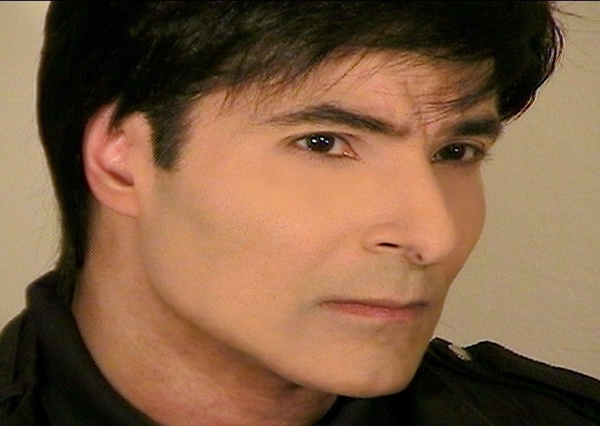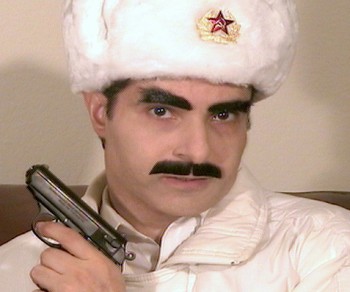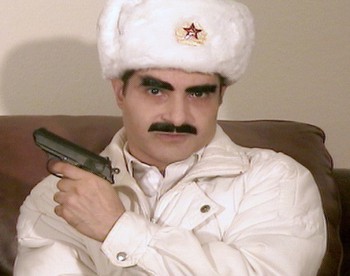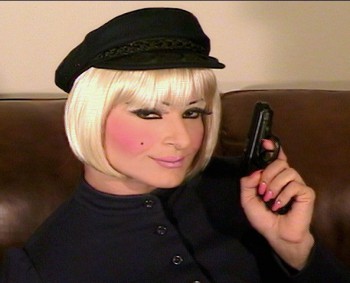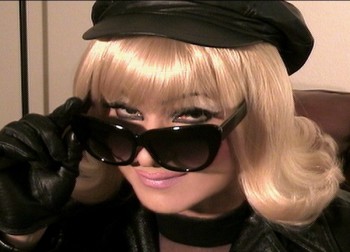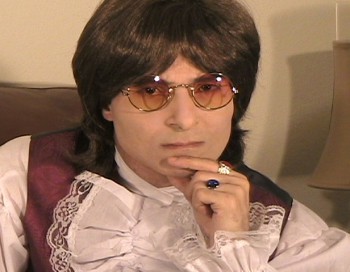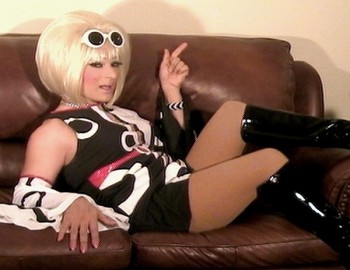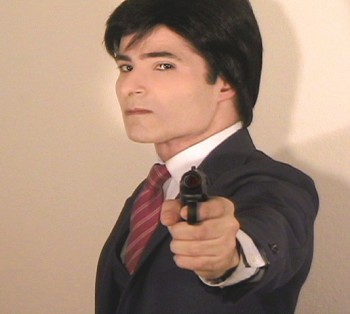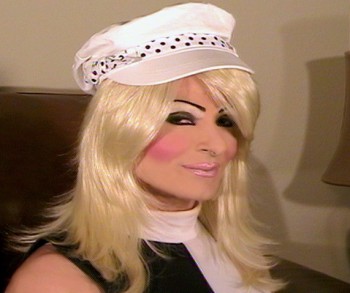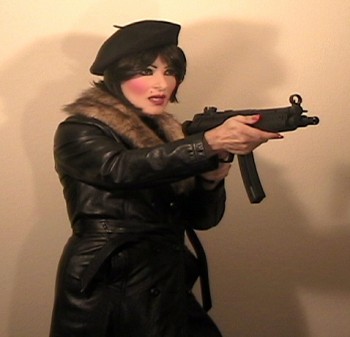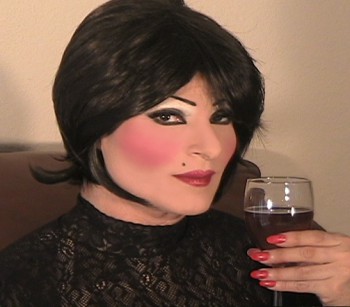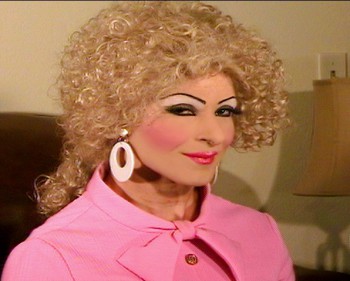Laz Rojas is a master of transformation! He makes work in film, photography, and art that consistently tread a tenuous line between complex and simple. His work is sharp, witty, multi-layered all in all thorough. One could say there is an idiosyncratic variety of different meanings to his work. In his mélange of imagery he is responsible for every little detail we see, for every role, for every costume! He shot, directed, edited, wrote and styled a four-hour, 52-scene audition tape, now known as One-Man Showcase, where he kisses himself, shoots himself and he has a dialogue with himself. Rojas, with his One-Man Showcase, assuringly produced one of the most legendary ‘audition’ tapes in the history of cinema. The still aspiring actor-writer-director, at the very beginning didn’t get the response he wanted, the response he deserved, but all these years later he is finally on the right track. With today’s audience and appreciation for indie and art production, Laz could now finally get his big break.
We sat down with the master himself and talked about movies, life and what is there to follow….
INTERVIEW: KATJA HORVAT
PHOTOGRAPHY: LAZ ROJAS
Does being an actor serve as a sort of escapism from reality?
I’ve never seen my acting as an escape from reality because I’ve never used it that way. When I watch a movie or a television show and watch other actors perform, I do so because I want to be entertained and I want to be transported to another place or time for a little while, so in that sense, being a member of the audience allows me to escape reality. But when it’s me doing the acting, when it’s me bringing a character and a story to life, that’s an entirely different thing. Then I’m the one creating the opportunity for the audience to escape, I’m the one transporting them to another place and time — like a magician performing an illusion and fully conscious of, and in control of, what he’s doing in order to perform it.
What do you strive for the most? Being an actor or director? Did you start to act because you wanted to direct and you didn’t have other actors to do the job or did you direct because you wanted to act, and there were no directors that would give you the job?
Actually, I began both acting and directing at an early age and at the same time, so I don’t prefer either one over the other. In fact, I’ve always seen them as different aspects of the same process, because as a filmmaker I’ve always had a comprehensive and all-encompassing vision that combines acting, writing, and directing into a seamless whole. I cannot approach something as an actor without simultaneously seeing it from the viewpoint of the director, nor can I write a script without seeing it from the viewpoint of both actor and director. Within my mind, all three happen simultaneously and complement each other fully.
I started making short films in the 1970s with a Super 8mm camera that my parents gave me for my tenth birthday, projects which I wrote and in which I cast myself and friends from school. I also made animated cartoons using paper cutouts and did the voices for all the characters myself. So right from the beginning, I was functioning as an actor/writer/director and wearing all three hats, and I wanted to be a triple-threat like Orson Welles.
During the early 1980s, however, I put my writing and filmmaking aside and concentrated solely on being an actor. I performed in various off-Broadway and off-off-Broadway productions for a few years, but by the late Eighties, I got the bug to write and make films again. Acting by itself wasn’t enough of a creative outlet for me; I wanted to do it all, just as I had done as a boy with that Super8 camera. So I moved to Los Angeles with the goal of selling a screenplay and then attaching myself as either the director or star, and over the next thirty years, I wrote more than twenty feature-length scripts of different genres and tried to get each of these projects off the ground. Some of the scripts I wrote had lead roles I specifically created for myself, while other scripts had no roles for me at all. And to date, none of them has ever been produced.
Do you think famous people are more interesting than non-famous ones?
Just because someone is famous doesn’t necessarily mean they’re interesting. I’m sure there are many non-famous people who lead very interesting lives, but no one outside their immediate circle knows about them.
In fact, I find many current celebrities as uninteresting as possible and I cannot fathom why people spend so much time following their every move on Twitter, Facebook, and other social media. As a baby boomer who grew up during the latter half of the 20th Century, I find celebrities of that era far more interesting, be they actors, directors, or singers, and I enjoy their work far more as well.
You also persuaded other forms of art, how come? Was that to find success and get your voice out there, or it’s more personal? Basically, what I want to ask is: Is your art for you or for other people?
I’ve always been very creative, and even as a young boy I explored different avenues through which to express that creativity before I started making films. Throughout my entire childhood, I drew cartoons and comic strips, painted portraits and landscapes, and wrote short stories and poetry. At one point, I even taught myself to play guitar and wrote a couple of songs, but I eventually abandoned that because I was already too busy with all the other things that I did.
During those years, my creativity was a deeply personal thing, because at that age it had absolutely nothing to do with any sort of career goal or aspiration. It was an exploration of who I was. I had all of these ideas inside my head and I was compelled to express them in whichever manner I could, so I drew, I painted, and I wrote in order to bring those ideas to life. Even if I never showed any of my work to anyone and no one ever saw it, I had to create it, because creating was as integral a part of me as breathing. When I received the Super8 movie camera, it became an additional tool with which I could express my creativity, and it allowed me to extend that creativity beyond anything I had previously done. When I held that camera in my hand, it felt like an extension of myself, much more than any pen or pencil or brush ever had, and it allowed my creativity to evolve to another level.
Everything I’ve ever created has been purely from inspiration, so in that sense I would say that my art has been for myself because I’ve never drawn, painted, or written anything for any pre-determined purpose or to anyone else’s specifications. I create when the inspiration strikes, and when it does, it hits me like a bolt of lightning and I’m absolutely compelled to act upon it. When it doesn’t strike, I cannot force it or fake it. So I just follow my muse wherever it leads, and it has taken me to places at times that I had never expected. I’ve written scripts that I never planned to write about characters and stories I never would have considered, simply because the inspiration hit me to do so and carried me through to completion.
In your work, are you more interested in telling stories or telling the truth?
Everything I’ve ever written, be it a story or a poem or a script, has been a work of fiction. That being said, the characters I create are very real and three-dimensional, and their stories, although fictitious, are as real to them as my own life is to me. Everything they say and do is based on the foundation of who they are and what makes them tick, and their reactions to the situations they find themselves in are authentic and rung true. Most of the stories I’ve written convey truths about the human condition that I think most people can relate to, and if what I’ve written makes those people think and touches their hearts, then those truths have been received and understood even if it’s on a subconscious level, and they are very real even if they’ve been presented within a framework of fiction.
Do you think your time is still coming?
It hasn’t arrived yet, so it must still be on the way. When I was acting back in NYC during my early 20s, I was called the next Al Pacino and it was a foregone conclusion among all who saw my work that my future held great promise and that the sky was the limit. However, here I am three decades later and success has eluded me with a vengeance. Despite my multiple abilities and the extent of those abilities, every single door I’ve knocked on has been shut in my face. I’ve dealt with people who seemed intent on making sure my career never gets off the ground, people who have told me to my face that I have no talent and that I’ll never get anywhere. But I refuse to quit. I refuse to allow such naysayers to determine what I can or cannot do with my life, whatever their motivations may be in trying to deter me and keep me down. I will not give them that kind of power over my personal destiny. I’ve been pursuing my goals my entire adult life, and I have no choice but to continue pursuing them until I achieve them or die, whichever comes first. If I were to give up today, I’d have nothing left to live for. For me, it’s akin to climbing up a mountain. Once you start, you have to keep going until you reach the top. What are you going to do, stop part of the way up? Then what? Climb back down to the ground, or just stay there? Once committed to that goal, you have to keep climbing until you reach the top or die trying. For me, it’s that simple a choice.
How has your relationship to movies/acting changed since you first persuaded that dream to now?
It has changed only in the sense that my abilities have grown stronger and become more varied over the years. When I performed theater in NYC during the early Eighties, I was quite serious and intense and comedy was not my forte. I came across as the intense, brooding type, a mixture of James Dean and Al Pacino, and I was cast almost exclusively in dramatic roles. But over time, I grew beyond that, not by conscious effort but almost as a sort of natural progression or evolution. And by the time I started working on my one-man showcase, I had branched out in all directions and had become adept at multiple genres in both my acting and my writing.
It’s an ongoing process, because I’ve found that my talents continue to grow with the passage of time and I develop new ones without needing to study or learn. Most people are very impressed with my one-man showcase, but to be perfectly honest, it seems lacking to me. I look at the scenes now and I’m dissatisfied with many of them because they are inferior to what I’m capable of at present. My acting, writing, and directing skills have evolved way beyond the showcase, and if I were to remake it today, every aspect of it would be at least ten times better. It’s almost like a snapshot of where I was creatively at that moment in time, and I’m as far ahead of it now as it was ahead of the Super8 films I made as a boy.
Do you think that the filmmaker or actor has to live his films or roles, to really be successful?
I assume you’re referring to method acting, which I must say in all honesty is something I’ve never ascribed much importance to simply because I’ve never operated that way. When I read, for example, that an actor who needs to portray a character who hasn’t slept in days actually refuses to sleep for days in order to experience the “truth” of that situation and use it in his performance, I tend to see that as silly. In my own acting, I’ve never used that approach because it’s never been necessary for me to do so. Whoever the character I’m portraying is, and whatever their situation, I just do it automatically without resorting to any method or technique. I just become the character, instantly and instinctively, as if by flipping some sort of mental and emotional switch inside me I become this other person.
I played over a hundred different characters in my one-man showcase, characters of various ethnicities, personalities, time periods, and both sexes, and this would never have been possible for anyone to do using a method or “living” the roles. I was able to do it because of my ability to simply become the character, to “channel” them, as it were. During the production of my one-man showcase, this was especially easy for me to do because the characters were those I had created as a writer. When I write, I see and hear everything in my head. I see the characters, the set, the costumes, the props, the camera angles, the editing, everything. It’s as if the script has already been shot and I’m watching an already completed film in my head. So when it comes to characters I’ve created myself, they are fully formed in my mind and all that is necessary for me to do is tap into that and become each character, automatically and effortlessly, no matter who or what they are. I know each of them intimately, what makes them tick, their entire life stories, and I can just flip a switch and activate that. I don’t need to work at it or plan it or think about it, it’s just there, complete and ready to be expressed and performed.
People have compared you to Cindy Sherman on numerous occasions by now. Are you familiar with her work and when was the first time you became acquainted with her?
I actually was unaware of her work until someone compared me to her a few years ago and said I was the Cindy Sherman of video. I see the similarities in our work in the creation and portrayal of multiple characters by one person, but while Cindy uses still photography to bring her characters to life, I took it one step further in my one-man showcase by portraying characters on video in scripted scenes. And while Cindy deliberately set out to create art with her photographs, the original motivation behind my showcase was to create a demo tape that displayed my abilities as an actor, writer, filmmaker, and editor all in one package. It was never meant for public consumption and was simply a selling tool targeted at agents, managers, producers, and casting directors. I didn’t intend it as art at all, and I was quite surprised when years later people were seeing it in that context and regarding it as a unique form of cinematic self-expression.
Where did you find inspiration for your One-Man Showcase and where did you learn all the techniques and tricks you used?
The idea for my one-man showcase came about from the sheer frustration of trying to break into the movie industry. After moving to L.A. in 1987, I spent the next five years writing scripts and trying to get the attention of agents and producers. By 1992, however, I had made little progress getting my foot in the door, so I decided to do something unique, something that would get me noticed and make me stand out from the crowd. Wishing to showcase my acting, writing, directing, and editing abilities all in one package, I came up with the idea of making a one-of-a-kind demo tape unlike anything anyone had done before — a production written, performed, directed, and edited entirely by me and in which I played all the characters in sample scenes from my scripts.
I went through all of my scripts and selected scenes based on the opportunity each one would provide to display all of my abilities, with no regard for how easy or how complex it would be for one person to accomplish it. Many of the scenes posed difficult challenges during production, from transforming myself into characters to creating the illusion that characters were physically interacting with each other, and I basically invented the tricks and techniques necessary to accomplish what I wanted as I went along. If you were to look at just a bit of the eighty hours of raw footage that I shot, you would see me literally coming up with those tricks and techniques right there in front of the camera. Sometimes I had a basic idea of what I wanted to do, but it wasn’t until I was actually doing it that I developed the method. So I basically learned them on my own and taught myself. It was an incredibly creative experience which allowed me to experiment freely and which forced me to think outside the box and push myself further and further beyond my previous boundaries.
What are you working on next?
The project I’m currently working on is a six-film franchise about a husband-and-wife team of British spies during the 1960s. It began as a script called “Absolutely Smashing” which I originally conceived as a one-off, but I wrote five sequels to it over the next three years and the project evolved into an entire franchise. I don’t intend to portray any of the roles in it but serve only as writer-director.
Since there are six films in the franchise which includes many characters and plots, the project is too large to describe here.
However, I’ve written an overview of the franchise which explores the overall concept of the project and individual aspects in detail, and this can be found here
Even though this franchise is set in the 1960s, it isn’t a spoof or a campy parody like the Austin Powers films. It’s a series of stylish and sophisticated period espionage films that combine action, adventure, humor, drama, intrigue, and romance. Films with a similar vibe that come to mind would include “North by Northwest” and “Charade”, as well as the early Bond entries. And since the main character is a female pop singer with a secret life as a spy, the franchise is also a time capsule of 1960s music, fashion, and pop culture.
This project is what I’ve dedicated the rest of my life to bringing to fruition. It’s a very ambitious project that has great blockbuster potential, and it’s capable of generating a variety of spin-off products and tie-ins such as toys, soundtrack albums, and even a clothing line. It also features an iconic lead female role that could make the right actress a global star and this era’s Audrey Hepburn, and a suave and sophisticated Cary Grant-like male supporting role as well in her fellow spy and husband. Since the franchise is set in locations throughout Europe and the lead roles must be cast with British talent, I’ve been looking primarily for a UK-based producer or production company, but it could also be made as an international or pan-European co-production with or without Hollywood funding.
How does your mother feel about your work?
Both of my parents were always extremely supportive of my creativity and made many sacrifices throughout their lives to ensure that I could follow my dreams and be successful. When I was eight years old, I was transferred to a school for gifted children after I scored 200 on an IQ test, and my mother took on both a full-time and a part-time job in addition to my father‘s full-time so they could afford it. And when I turned down a scholarship after scoring in the 97th percentile on both my PSAT and SAT in order to pursue a career in film, my parents were completely supportive of my decision and allowed me the freedom to choose my own path and follow my heart.
Other parents may have used that opportunity to compel their child to seek a career in the law or in business, but mine knew that creativity is what drove my soul and that to discourage me from a career in the arts would eventually snuff out who I am.
One of my greatest regrets is that my father, who died in 2007, isn’t around to see me succeed, and my greatest fear is that my mother, who is now 78, will also pass without seeing me finally fulfill my potential and achieve my goals. Even at this stage, she is still encouraging me to stick with those goals and never give up. She is my number one fan, and it’s as much for her as for myself that I continue to struggle despite all of the setbacks and all of the obstacles. I still have time, but if I were to succeed after she’s gone, it would mean far less to me and seem almost anti-climactic.
Do you think people worry too much about money?
I’ve never felt that money is the key to happiness, and there are people with loads of money who are terribly unhappy, but it’s a simple fact of life that money is necessary to survive and get by in this world. How much each person should worry depends on various factors that are unique to each individual and their situation in life, so I really cannot say whether someone worries too much without knowing those factors. I will say, however, that while having money doesn’t necessarily make you happy, worrying about not having enough can definitely make you unhappy. So if worrying about it reaches the point where it interferes with a person’s life and relationships, and even impacts their health, then they are definitely worrying too much.
What is the longest you’ve gone without sleep?
The longest I’ve gone without sleep was three days, way back in 1992 during the Rodney King riots in L.A. I stayed awake for three consecutive days watching the wall-to-wall, 24-hour news coverage of the event.
What is your idea of perfect happiness?
For me, it is impossible to be happy without being able to express my creativity, to do what I do as an actor, a writer, and a filmmaker. Those things are the reason I exist, they’re why I breathe, and to have been denied the opportunity for more than three decades to bring at least one of my projects to the screen and bring all that creativity to fruition has nearly killed me. As I mentioned earlier, I used to create simply for its own sake because it’s what I do naturally. But ever since I decided to pursue cinema professionally, creating a project is only the first half of the equation. Writing a script gives me great pleasure as a writer, but as a director, I need to take it beyond that point and put those words on the screen. To not do so is akin to a composer writing a song and then never having the opportunity to perform it and having it enjoyed by an audience. The music remains forever trapped inside his head begging to be heard.
When I was 20, there were three things that needed to happen in my life for me to experience perfect happiness. First, I needed to establish a sufficiently successful career as an actor, writer, and filmmaker to make a living at it. Second, I needed to find the woman who was my soul mate, a woman who was equally creative and with whom I could share that career as a team. And third, we needed to have a large family and be equally successful in both our professional and personal lives, to strike a perfect balance and make it work. A tall order, perhaps, but that was my game plan, the life I wanted to build.
Thirty years have come and gone, and none of these three conditions have been satisfied. I’ve spent all of that time trying to establish the first, and the other two have remained perpetually on hold. I’ve always been an incurable romantic, but at this point in my life I have sincere doubts whether I’ll ever meet that special woman or have that family I wanted. For all I know, life could surprise me and it could happen tomorrow, but if it doesn’t, I’ve made my peace with that and I think I could live with it.
What I couldn’t live with is the failure to bring my “Absolutely Smashing” franchise to the screen. I have searched the depths of my heart and soul for the past few years and I know this to be true. Since I have no children and maybe never will, “Absolutely Smashing” is my child, something I’ve created that I’ve poured my soul into and that I want to leave behind when I die as a testament that I was here and of what Laz Rojas was all about. If that doesn’t happen, if this project ends up being stillborn like all those that preceded it, I will never be happy. In fact, I will consider my life to have been pointless and an utter waste of time, talent, and potential. Most people are afraid of death. Death in and of itself doesn’t frighten me. What frightens me is dying without ever having accomplished any of the things I could have accomplished, without having been able to bring at least this one project to the screen. All the sacrifices my parents made, and the ones I’ve made, will have been for nothing. All of my talents, my abilities, my intelligence, and everything else that makes me who I am, will have served no purpose.
What do you think really matters in the end?
This is a question which I imagine different people would answer differently, so I can only speak for myself. And even then, my thoughts on this have changed and evolved from what they were years ago. At this point, I have reached a place in my life where the only thing that really matters to me is bringing “Absolutely Smashing” to the screen. It may seem obsessive, but that’s what everything that’s happened in my life up to now has boiled down to. I look ahead and that is the only path that I see. As the years have gone by, the paths before me have been narrowed down further and further until this is the only one that remains. And other things that used to matter to me have been left by the wayside, leaving me only with this project. Even if I won the lottery tomorrow, it wouldn’t change that. The justification for my existence, and its ultimate vindication, depends on the realization of this project.
It’s as if everything creative that I’ve done since I was a boy is summed up by this project and lead inexorably to its creation, and getting it from the written page to the screen is the purpose of my life. It’s my quest, my Holy Grail.
Visitez:
www.lazrojas.com
www.youtube.com/user/lazfilm2
www.facebook.com/LazRojas17
www.facebook.com/laz.rojas
www.gofundme.com/LazRojas

